As Mexico & the USA autocratize, South Korea faces an attempted coup.
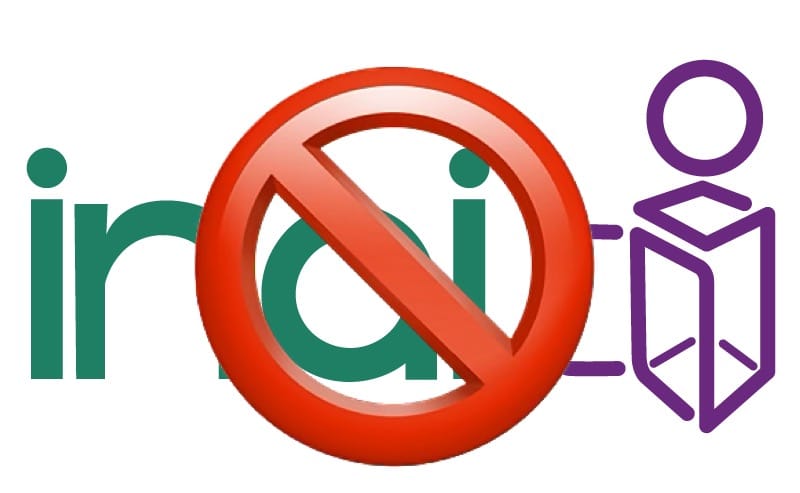
Good afternoon from Washington, soaking up sun while I can. If you’re reading this, you’ve subscribed to Civic Texts from yours truly. Thank you!
Please consider upgrading to a paid membership, if you can. Your support means I can continue to make CivicTexts free and open to all, not put the information, insight, and analysis behind a paywall.
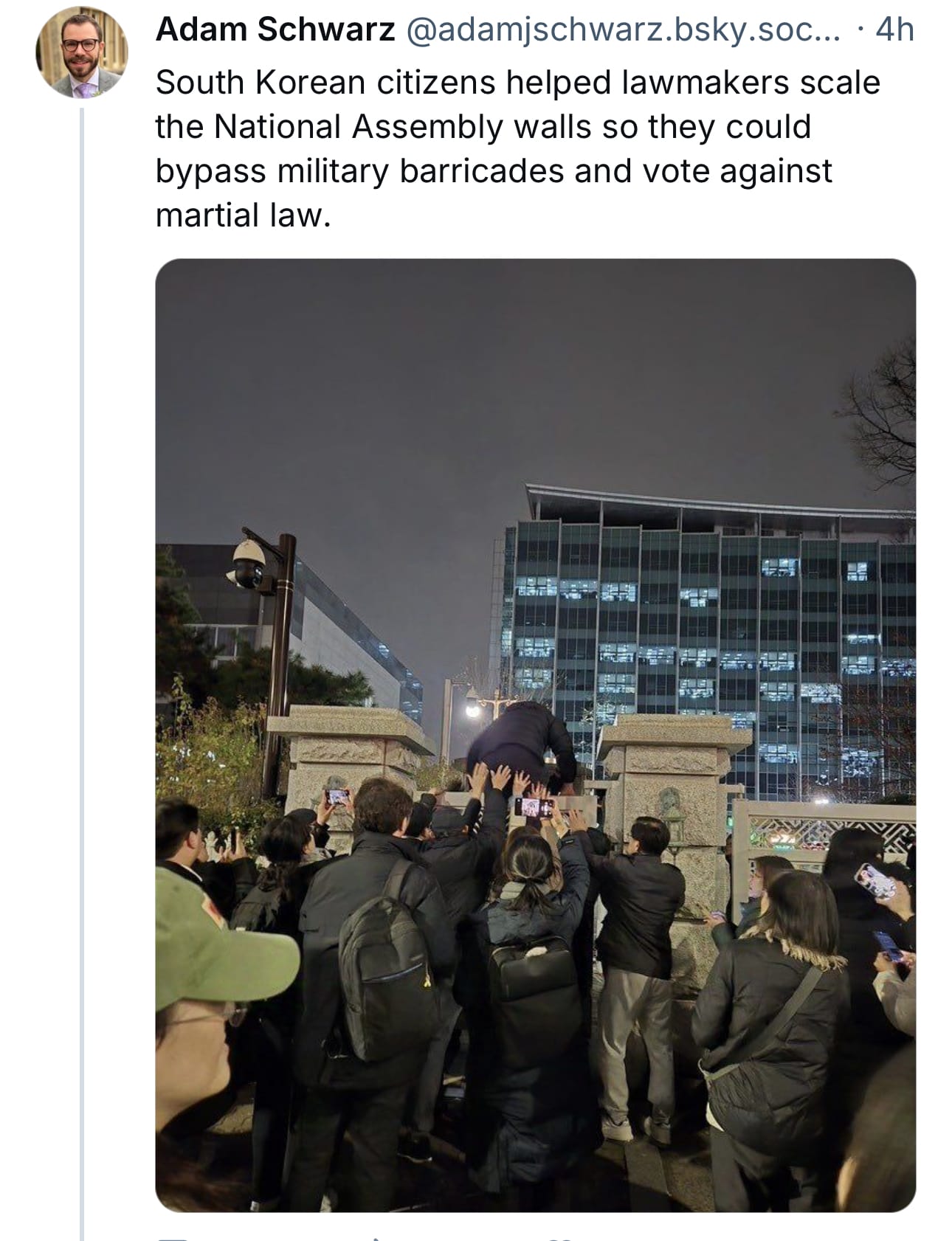
The Heart and Seoul of Democracy
I’m following the news out of South Korea, where President Yoon Suk Yeol declared emergency martial law, followed by the political opposition in their National Assembly voting against the decree.
On the Media has a handy guide for this sort of breaking news event.

The Associated Press reports that the military and police are leaving the parliament, where lawmakers remain.
The Koreans who came out to protest in defiance of martial law are a timely reminder of what democracy looks like in a nation of active citizens that is resisting a slide back into autocracy, as Bryan Pietsch reports:
Protests, large gatherings and political acts including meetings of the legislature are prohibited under martial law. Despite that, crowds gathered in the bitter cold outside the building after midnight. They cheered when the legislature voted to block martial law.
In an instantly iconic 21st century moment, the leader of South Korea’s Democratic Padry “livestreamed himself himself scaling the walls of the National Assembly to bypass military barricades so that he could vote to overturn the President's martial law,” per Adam Schwarz over on Bluesky.
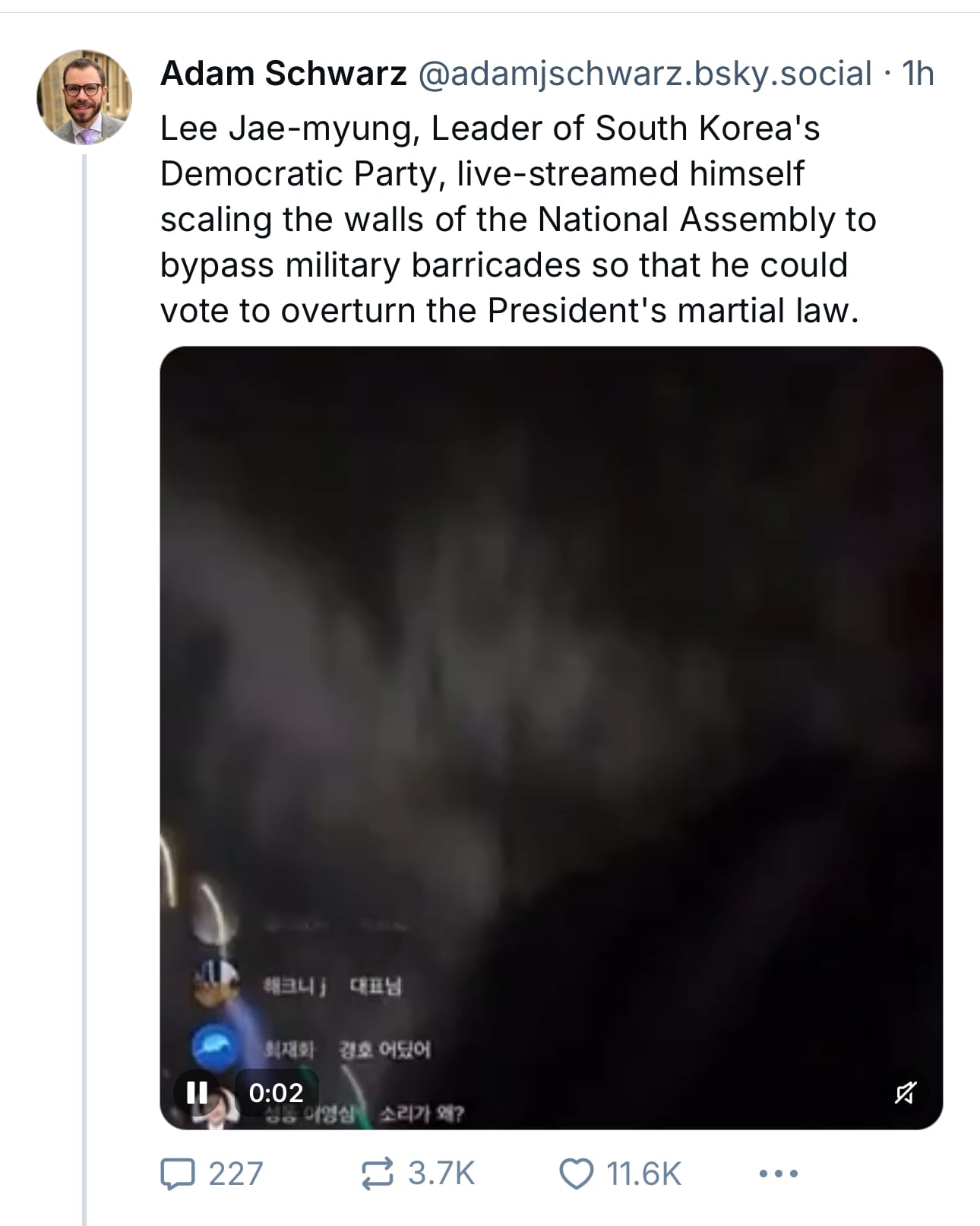
As Schwarz observed, “South Korean citizens helped lawmakers scale the National Assembly walls so they could bypass military barricades and vote against martial law.”
As I write, South Korea is now in a constitutional crisis. Schwarz warned this could be a harbinger of worse to come around the world:
“What's happening in South Korea is a military-facilitated autocratic overthrow of democracy. The grounds for martial law are without merit. Worrying for the wider democratic world. Trump inspired Western authoritarians to reject election results. This may further encourage full autocratic takeover. Even if Yoon Suk Yeol's coup fails, this will still encourage other aspirational dictators in democracies to attempt full overthrow of democracy. Trump attempted to overthrow democracy on 6 January 2021. He failed but the mere act of the attempt still inspired others like Bolsonaro to do the same.
Just so.
Aspiring autocrats and entrenched authoritarians watch one another and adopt the same plays.
That’s why it’s essential for journalists to report on the authoritarian playbook differently.
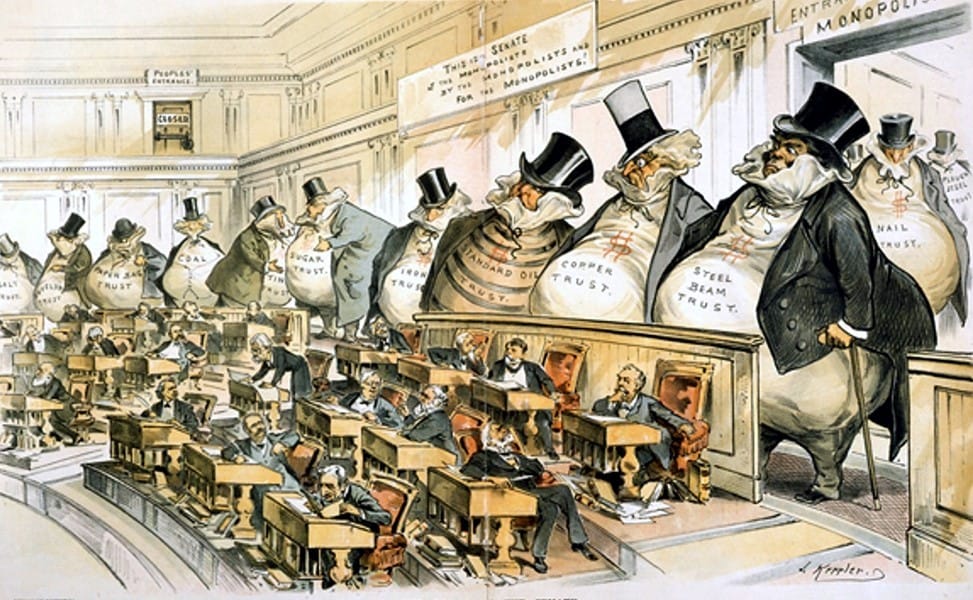
“It’s the Corruption, Stupid”
I’ve read a lot of election post-mortems, but I think there’s a missing element from the Gilded Age.
If folks don’t run against the abuse of entrusted power for personal gain on behalf of foreign nations, corporations, and oligarchs by any politician — including those of their own party — they’re seen as complicit or corrupt themselves.
That creates a permission structure for unscrupulous demagogues and oligarchs to engage in corruption becauze ”everyone does it.”

That’s one reason to be concerned about President Biden’s pardon of his son, but it strikes me as ludicrous.
“The Hunter Biden pardon can be reasonably criticized, but the idea that Trump needs political cover, fresh ideas for transgressions, or new precedents from Biden fails to grasp Trump,“ writes David Kurtz:
“It’s fear-based analysis that anticipates what the bully will do and blames the victim for bringing it on himself. Trump has already abused the pardon power in unprecedented ways to protect himself, plans to abuse it again in the future, & promised throughout his campaign to undermine the rule of law by wrecking the Justice Department & federal law enforcement.”
What’s past is prologue. Remember in the years to come that “Corruption isn’t costless: it erodes public trust, and it undermines the rule of law.”

It’s a historic tragedy that this administration was unable to remind us all of that after the election — or before it.
When the perception of corruption becomes ubiquitous, democracies begin dying.
When the reality of corruption in an authoritarian undermines public health, safety, privacy, civil libertes, the rule of law, free elections, and human rights, it’s too late.
The Open Government Fiesta is Over
Which brings us to Mexico, where I began to be increasingly concerned about threats to transparency and election integrity in Mexico threatening democratic stability in the Americas on 2023.
As I wrote then, public accountability and privacy have been under threat in Mexico since 2021, but the growing risk has been under the radar in the USA:
That’s a mistake: both Congress and news media should be focusing on what the changes to good governance in election systems, open government agencies, & chilling of NGOs would mean to Mexico, especially when combined with ongoing threats to journalists and activists from cartels, organized crime, & corrupted police.
The destabilization of Mexican democracy would represent a huge diplomatic, economic, and security challenge for the USA which must neither be ignored nor neglected.
What happens there will affect more than our politics, especially if conditions at the border deteriorate after a major natural disaster, from supply chains to labor supplies.
The looming challenges of migration from destabilized states should be driving comprehensive immigration reform, with investments in human capacity, courts, and services that would all increase resilience against the escalating stress that millions of people seeking asylum and economic opportunity in the USA will place on our own systems, as we are seeing today across the southern border of our union.
The renewed efforts to eliminate this transparency institution are a dagger of Damocles dangling over the heart of a still-young democracy whose stability and development are critical to American national security, public health, and public safety.
An assault on any one of institutions that provides checks and balances in a nation destabilizes the whole, from an independent judiciary to a free press to nonpartisan electoral administration.
An assault on all of them at once is a flashing WARNING sign that should be provoking an “all hands on deck response from the United States.
The long arc of our nation’s history with Mexico suggests to me that honesty, humility, and humanity from our nation’s leaders will be more effective here than bullying, bluster, or blunt demands or threats that would further fuel toxic headwinds.
In a different timeline, the President, Congress, and Supreme Court might be issuing a joint statement encouraging the Government of Mexico to invest in the laws, institutions, and people that are at the heart of a thriving democracy, reminding them that to allow any one party or politician to corrupt one organ risks killing the entire body politic.
In the world we have, such a public alignment between the leases of our own government seems inconceivable. It should be possible for the US government to speak as one to our neighbor in a new clear, stunning statement offering a hand in friendship to our neighbor partner to build more healthy democratic states together that center human rights, human dignity, and human potential.
A year later, Mexico and the USA are now autocratizing at the same time, in their own exceptional ways.
Over the Thanksgiving break, Mexico moved to disband seven independent agencies and begin the process of removing the legal provisions that created them from their Constitution.
“We are undergoing regime change”, said María Marván, former head of the National Institute of Transparency for Access to Information and Personal Data Protection. “We are leaving behind a democracy that’s weak and has defects, and moving toward an expanding autocracy.”
It’s unclear to me how hard the United States fought to oppose these changes, but I’ve noticed no obvious public diplomacy or any statement from Secretary of State Tony Blinken or President Joe Biden or Administrator Samantha Power.
It’s striking that Biden’s “Summit For Democracy” efforts have been shown to be pixel-thin when it came to checking power, politics, and populism abroad, much less in the United States.
The 7 independent agencies Mexico is now in the process of removing from its Constitution “were designed to check state power by giving citizens access to official documents, providing nonpartisan evaluation of government programs, regulating the telecommunications and energy sectors, and blocking monopolies.”
But Mexican President Claudia Sheinbaum claimed to reporters that “you don’t need big agencies or big bureaucracies to make transparency a reality. These big agencies were created to fight corruption, but nonetheless corruption continued.”
She’s mistaken, in my view: independent democratic institutions check corruption & anti-competitive behavior, and regulate commerce and utilities to protect consumers.
If you’re unfamiliar with the open government watchdog Mexico is dissolving and why Sheinbaum’s claims are so weak, set aside time to read law professor Margaret Kwoka’s most recent paper, “Transparency Guardians.”
The paper is based on the research she conducted over many months on the Instituto Nacional de Transparencia, Acceso a la Información y Protección de Datos Personales (INAI):
INAI is a leader in the global transparency community, but its model is not well known among U.S. policymakers, academics, and advocates. Using an embedded approach to institutional ethnography and its interdisciplinary methods, I conducted dozens of hours of recorded interviews, engaged in countless observations of proceedings and workflow, drew data from public reports, and situated my findings within the transparency scholarship in Mexico. This Article documents how the legal architecture enables INAI to accomplish its mission and makes the case that INAI demonstrates the potential of a well-designed information commission both to guarantee ATI as a fundamental human right and to serve as a counterweight to democratic backslide that is too common around the world.
Mexico’s democracy, economy, and Mexicans are all likely to come to harm in its absence.
Kwoka’s previous paper made a strong case for an independent “Transparency Commission” in the United States modeled on Mexico’s INAI, which spans all three branches of government.
It appears that both of our nations will have to do without one next year.
In 2025, remember what the CFPB does: Protect Americans!

If you missed it, there was a tremendous proposal out of the Consumer Financial Protection Bureau today that would stop data brokers from selling our personal info to scammers, stalkers, & spies.
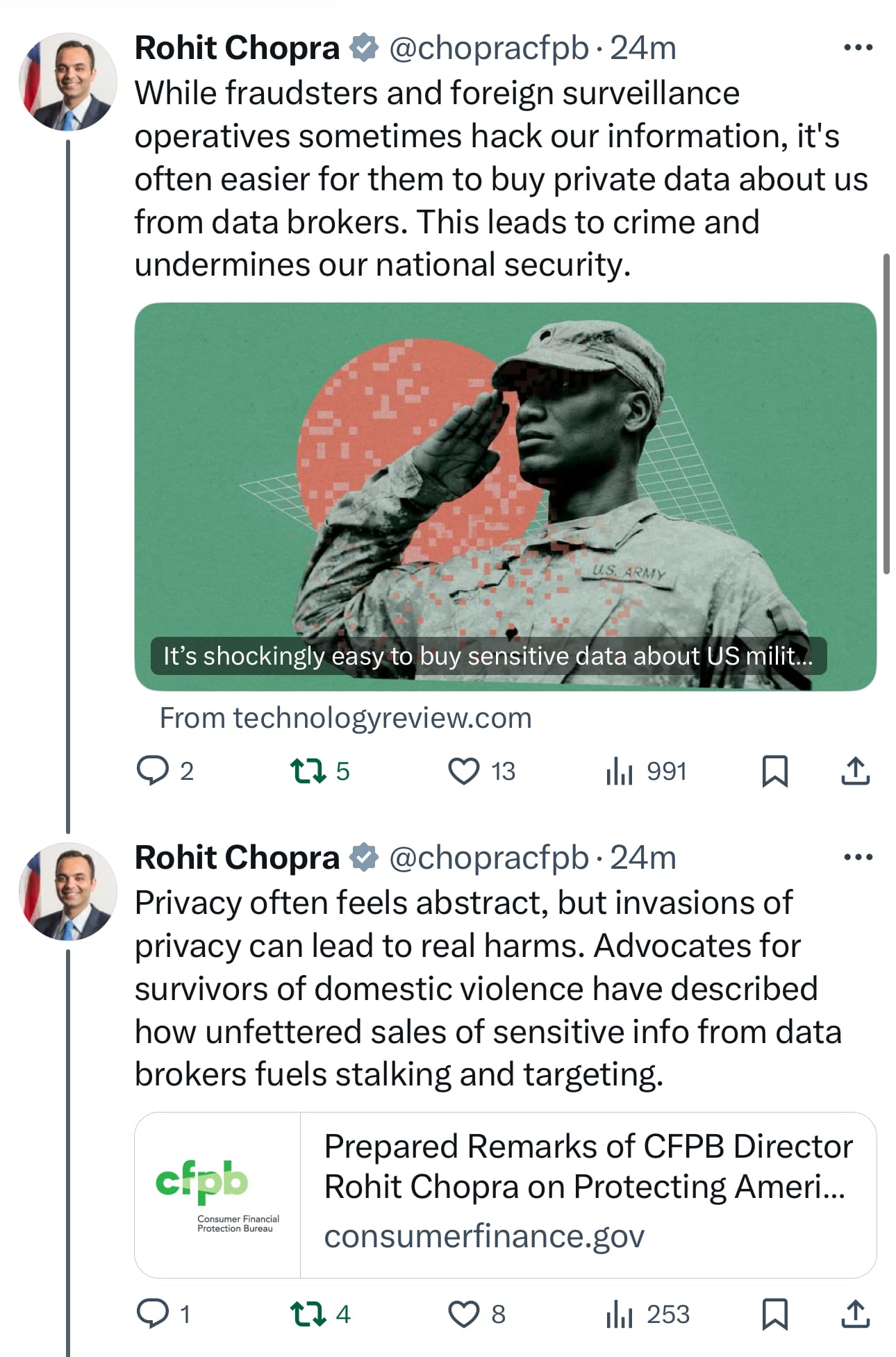
I love to see a regulator cite journalism from Wired.com and TechReview. I hate to know what’s coming, if the Trump adminlustration repeals this rule or outright defunds the CFPB.
That’s it for today.
Please consider sharing this post with your social network and upgrading to a paid membership.



